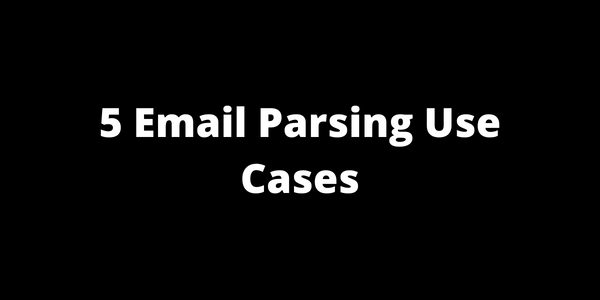No Code Email Parsing Features October 2022 · ian
New Email Parsing Features
A few weeks ago we launched our brand new email parsing feature and covered it in a launch post which you can see here if you missed it. To summarize, HostedHooks now offers custom inbound email addresses that allow anyone to send an email to HostedHooks and we will both ingest the email and then parse it based on rules that you set up. These rules consistently turn unstructured email data into JSON which can then be used to integrate with other platforms like Airtable, Slack and many others. One of the best parts is that it requires absolutely no code. Since our launch we've been quickly iterating on user feedback and in this post we are going to share everything that we've added.
Email Subject Line Parsing
Previously, when setting up parsing rules you could only parse the email body. We've now added in the ability to parse the subject line as well, with as many rules as you'd like. Let's show you how that works.

Here you can see that when creating a new rule for parsing, you can choose the subject line content type, which will pull in a sample email's subject line.

With that you can then apply as many parsing rules as you'd like to get your desired final parsed output (JSON).
Add Dynamic Data To Your Parsed Emails
When parsing emails, you may want to include data in your parsed JSON that is not available in the actual email or subject line. These are things like dates and addresses and other data points that live on the actual email record. Starting today, you can now add this type of data to your parsed email output. We currently support two dynamic data points - Created At and From Address. If we are missing one you want, just reach out (email or discord) and we can get it added.
Created At Dynamic Data
Here you can see how the Created At data point works. Simply chose the data content type and select the Created At data source. This will pull the created at date from your email record and populate it for this rule. Moving forward all new emails that come in will be parsed with this dynamic data point.

From Address Dynamic Data
Here you can see how the From Address data point works. Simply chose the data content type and select the From Address data source. This will pull the from address from your email record and populate it for this rule. Moving forward all new emails that come in will be parsed with this dynamic data point.

Test Your Email Parsing Rules Against Other Sample Emails
When building your email parsing rules, you have to assume that each email you receive will have a similar structure and that your rules will be able to parse those emails effectively. To help with this we wanted to add in a way for our users to test that repeatability, so we've given you the tools to rotate between sample emails when building your parsing rules. Moving forward you will see a dropdown that will allow you to switch between other emails that you've received and apply your parsed rules to them.

You can see here the dropdown to choose other sample emails. Once you hit Save, our parsing engine will re-run your parsing rules against this new email and provide a preview of how they were applied. If everything is consistent and your rules are setup properly, you should see the final JSON output value change with the data from the new sample email.
Free trial
A quick reminder that our email parsing engine comes with a very generous free tier which you can get by signing up at Hosted Hooks. We provide up to 50 parsed emails a month on the Free Hobby plan which should give you more than enough room to build your parsing rules and test them out.
Join us in our Discord Community and let us know if you have any questions!
Try HostedHooks Free
Getting started is easy! No credit card required.


